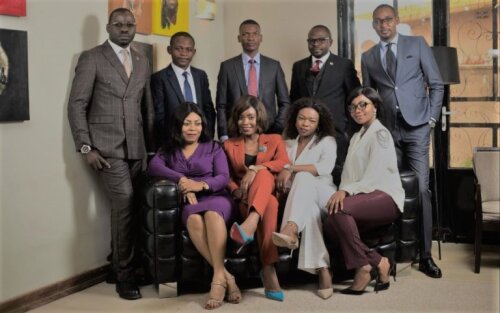Best Renewable & Alternative Energy Lawyers in Lubumbashi
Share your needs with us, get contacted by law firms.
Free. Takes 2 min.
List of the best lawyers in Lubumbashi, DR Congo
About Renewable & Alternative Energy Law in Lubumbashi, DR Congo
Lubumbashi, as the second-largest city in the Democratic Republic of the Congo (DR Congo), is becoming an important hub for renewable and alternative energy projects. Renewable and alternative energy law in Lubumbashi involves the legal frameworks governing the production, investment, distribution, and consumption of energy derived from sources like solar, wind, hydroelectric, and biomass. As demand grows for sustainable power sources to support population growth and industrial expansion, the legal landscape continues to evolve in response to economic, environmental, and social needs.
The Congolese government recognizes the significance of renewables in addressing energy shortages and expanding electricity access, especially in areas where national grid connections are limited. This area of law covers permissions, licensing, property agreements, environmental impact assessments, tariffs, and incentives for investments in renewable initiatives.
Why You May Need a Lawyer
Working in renewable and alternative energy often involves navigating complex regulations, local and national laws, and contractual arrangements. Here are common situations where legal assistance may be necessary:
- Securing permits and licenses for solar, hydroelectric, or wind energy projects
- Understanding or negotiating Power Purchase Agreements (PPAs)
- Protecting intellectual property for energy technologies
- Resolving land acquisition or land use disputes
- Ensuring compliance with local environmental regulations
- Managing tax and incentive eligibility
- Forming joint ventures or partnerships with local entities
- Handling cross-border energy trade issues
- Resolving conflicts with utility companies or government agencies
- Seeking compensation for project delays or damages
Legal assistance helps protect your business interests, ensures regulatory compliance, and minimizes risks associated with renewable and alternative energy investments and operations.
Local Laws Overview
In Lubumbashi, key legislation and regulations directly impact renewable and alternative energy projects. The primary legal instruments include:
- The Electricity Code - Provides the overall framework for energy supply, including licensing requirements for independent power producers.
- Environmental Law - Mandates environmental impact assessments for most large-scale energy projects, with procedures governed by the Ministry of Environment.
- Investment Code - Sets incentives for investors, such as tax reductions and customs exemptions, which apply to renewable energy initiatives under certain conditions.
- Land Law - Governs land acquisition and rights of use, which are critical for installing energy infrastructure.
- Local Urban Regulations - Address zoning and construction permits required at the city or provincial level in Lubumbashi.
- Tariff Regulation - Managed by the Autorité de Régulation de l’Électricité (ARE), which oversees pricing and tariff approvals for energy producers.
It is important to note that obtaining a license or concession to produce, distribute, or sell electricity from renewable sources involves several steps with different government authorities. The regulatory environment is continuously developing, so staying updated with recent regulatory changes is essential.
Frequently Asked Questions
What types of renewable energy projects are most common in Lubumbashi?
Solar and hydroelectric projects are currently the most common types in Lubumbashi, due to the region's abundant sunlight and water resources. Smaller scale biomass and wind energy projects are also being explored.
Is special approval needed to install solar panels at my business or residence?
While small solar systems for personal use may not require formal approval, larger or grid-connected installations often do. It is important to consult local regulations and, in some cases, notify or obtain permits from relevant authorities.
Can foreign investors participate in renewable energy projects in Lubumbashi?
Yes, foreign investors are welcome and can benefit from incentives under the Investment Code. However, they must comply with Congolese laws regarding business registration, land acquisition, and energy sector regulations.
Who regulates energy tariffs in Lubumbashi?
Energy tariffs are overseen by the Autorité de Régulation de l’Électricité (ARE), the national electricity regulatory authority. They ensure that tariff structures are fair and consistent with national policies.
What environmental requirements apply to new energy projects?
Most new projects require an Environmental Impact Assessment (EIA) before receiving approval. This ensures that projects do not negatively affect the environment or local communities.
How are land rights handled for renewable energy installations?
Land rights in Lubumbashi are governed by national land laws, which require proper documentation and registration. For large projects, you may need to negotiate with local landholders and obtain approvals from government agencies.
What legal risks do renewable energy project developers face?
Risks include unclear land ownership, changing regulations, contract disputes, and potential conflicts with government agencies or local communities. Legal due diligence and strong contracts can help manage these risks.
Are there government incentives for renewable energy investments?
Yes, the DR Congo offers various incentives such as tax breaks, customs duty exemptions, and support from investment promotion agencies for qualifying renewable energy projects.
How can I ensure my renewable energy business complies with all laws?
Work with a local lawyer to review all applicable regulations, secure necessary permits, maintain compliance records, and stay updated on regulatory changes.
What should I do if I encounter a legal dispute in my project?
It is advisable to consult a qualified lawyer familiar with renewable energy law immediately. They can assist in negotiations, mediation, or represent you in court if needed.
Additional Resources
If you need more information or official guidance, the following organizations and government bodies can be helpful:
- Ministry of Energy and Hydraulic Resources - Responsible for policy and oversight of the energy sector.
- Autorité de Régulation de l’Électricité (ARE) - The national electricity regulatory authority.
- Agence Nationale pour la Promotion des Investissements (ANAPI) - Provides information for investors and can assist with permits and incentives.
- Ministry of Environment - Handles environmental compliance and impact assessments.
- Provincial Government of Haut Katanga - Manages local permits and urban regulations in Lubumbashi.
- Federation of Businesses of Congo (FEC) - Offers resources and networking for businesses in the energy sector.
Next Steps
If you are considering a renewable or alternative energy project in Lubumbashi or are facing a legal issue related to this sector, consider the following steps:
- Assess your project or legal situation and determine your specific legal needs
- Gather all relevant documents, permits, contracts, and correspondence
- Contact a qualified legal professional with experience in renewable energy law in Lubumbashi
- Discuss your goals and challenges openly with your lawyer so they can provide tailored advice
- Stay informed about regulatory developments that could affect your project or rights
- Utilize resources from relevant governmental and business organizations for additional support
A knowledgeable lawyer can guide you through licensing, compliance, contract negotiation, dispute resolution, and help you make informed decisions that support the long-term success of your renewable and alternative energy endeavors in Lubumbashi, DR Congo.
Lawzana helps you find the best lawyers and law firms in Lubumbashi through a curated and pre-screened list of qualified legal professionals. Our platform offers rankings and detailed profiles of attorneys and law firms, allowing you to compare based on practice areas, including Renewable & Alternative Energy, experience, and client feedback.
Each profile includes a description of the firm's areas of practice, client reviews, team members and partners, year of establishment, spoken languages, office locations, contact information, social media presence, and any published articles or resources. Most firms on our platform speak English and are experienced in both local and international legal matters.
Get a quote from top-rated law firms in Lubumbashi, DR Congo — quickly, securely, and without unnecessary hassle.
Disclaimer:
The information provided on this page is for general informational purposes only and does not constitute legal advice. While we strive to ensure the accuracy and relevance of the content, legal information may change over time, and interpretations of the law can vary. You should always consult with a qualified legal professional for advice specific to your situation.
We disclaim all liability for actions taken or not taken based on the content of this page. If you believe any information is incorrect or outdated, please contact us, and we will review and update it where appropriate.











